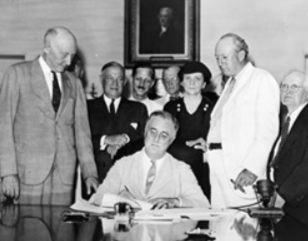“We can never insure one-hundred-percent of the population against one-hundred-percent of the hazards and vicissitudes of life. But we have tried to frame a law which will give some measure of protection to the average citizen and to his family against the loss of a job and against poverty-ridden old age. This law, too, represents a cornerstone in a structure which is being built, but is by no means complete…. It is…a law that will take care of human needs and at the same time provide for the United States an economic structure of vastly greater soundness.”
-President Franklin D. Roosevelt, at the signing of Social Security Act, August 14, 1935
“No longer will older Americans be denied the healing miracle of modern medicine. No longer will illness crush and destroy the savings that they have so carefully put away over a lifetime so that they might enjoy dignity in their later years. No longer will young families see their own incomes, and their own hopes, eaten away simply because they are carrying out their deep moral obligations to their parents, and to their uncles, and their aunts. And no longer will this nation refuse the hand of justice to those who have given a lifetime of service and wisdom and labor to the progress of this progressive country.”
-President Lyndon Johnson, at the signing of the Medicare Bill, July 30, 1965
Social Security and Medicare are both celebrating birthdays this summer. 80 years ago Social Security became one of the foundations of Roosevelt’s New Deal and 30 years later, Medicare fulfilled one of the promises of Lyndon Johnson’s Great Society. Together, these two programs have kept millions and millions of older Americans out of poverty, extended health care to one of the most vulnerable segments of our population, and allowed generations the security that no matter how dire their circumstances may be as they age, their basic health and physical needs will be met.
Social Security Facts (from the U.S. Social Security Administration)
- Nine out of ten individuals age 65 and older receive Social Security benefits.
- Social Security benefits represent about 38% of the income of the elderly.
- Among elderly Social Security beneficiaries, 52% of married couples and 74% of unmarried persons receive 50% or more of their income from Social Security.
- Social Security is the major source of income for well over half of the elderly.
- Among elderly Social Security beneficiaries, 22% of married couples and about 47% of unmarried persons rely on Social Security for 90% or more of their income
Social Security Myth (from AARP) – Social Security will be broke by the time most baby boomers retire
If you believe this, you are not alone. Many Americans have become convinced that the Social Security system won’t be there when they need it. In an AARP survey released last year, only 35 percent of adults said they were very or somewhat confident about Social Security’s future.
It’s true that Social Security’s finances need work, because over the long term there will not be enough money to fully cover promised benefits. But radical changes aren’t needed. In 2010 a number of different proposals were put forward that, taken in combination, would put the program back on firm financial ground for the future, including changes such as raising the amount of wages subject to the payroll tax (now capped at $106,800) and benefit changes based on longer life expectancy. However, making the necessary changes would require an act of Congress, and this seems to be a particularly challenging time for Congress to agree on much of anything.
Social Security 80th Anniversary Timeline (Infographic)
Medicare Facts (from the Kaiser Family Foundation)
Medicare is the federal health insurance program created in 1965 for all people ages 65 and older, regardless of income or medical history, and expanded in 1972 to cover people under age 65 with permanent disabilities.
- Medicare provides 54 million Americans with health insurance.
- As health care is one of the leading causes of bankruptcy, Medicare also provides financial security to older people and those with disabilities.
- Medicare spending accounted for 14% of total federal spending in 2013.
- Medicare accounted for 20% of national personal health spending in 2012.
- Nearly 9 million beneficiaries (16%) are nonelderly people with disabilities.
- 13% of Medicare beneficiaries are age 85 or older.
The Story of Medicare (Video from the Kaiser Family Foundation)






